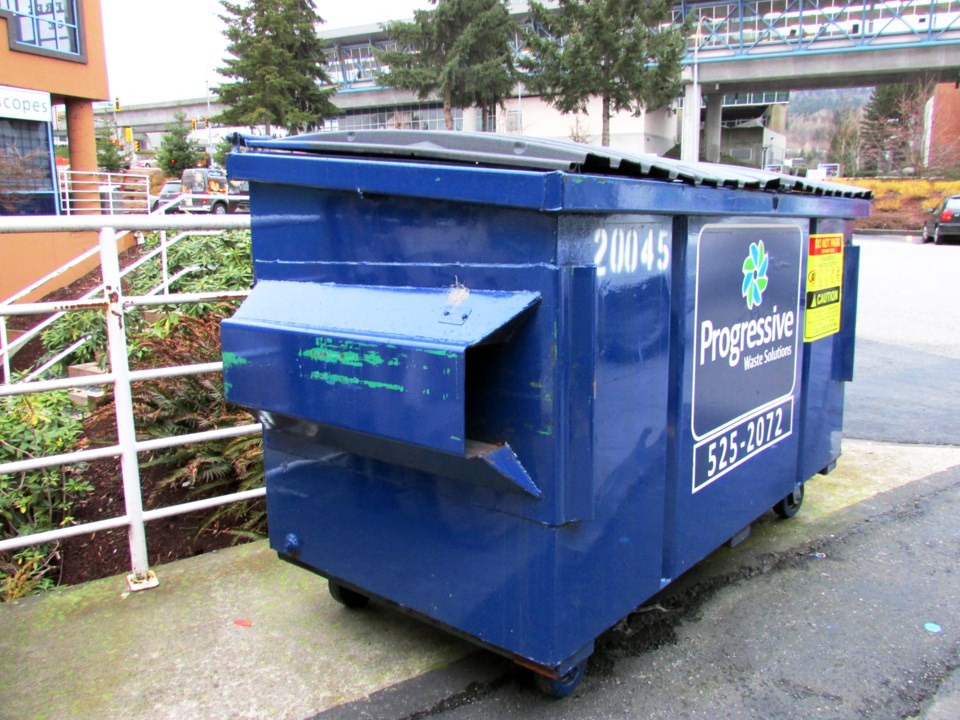The City of Burnaby was fined a hefty surcharge fee compared to other municipalities for delivering banned garbage items to Metro Vancouver waste facilities.
In 2012, the city was hit with a surcharge fee of $17,551, beating out the three other municipal haulers penalized, including $2,500 to the City of White Rock, $1,291 to the City of Port Coquitlam, and $1,250 to the District of North Vancouver, according to a Freedom of Information request obtained by the Vancouver Sun.
Burnaby is unique in how it handles multi-family and commercial waste collection programs, according to Dipak Dattani, assistant director of engineering. Waste is collected at these sites in large containers by the city’s own fleet, which means there’s more potential for the banned materials – from electronics to corrugated cardboard and yard trimmings – to go unnoticed.
“I know about 92 per cent of the banned materials were from multi-family and commercial facilities, and a very small portion was from the single-family and two-family collection,” Dattani told the Burnaby NOW.
Dattani said 98 per cent of the banned materials were electronics.
“Over time, we have undertaken measures so we have amended our solid-waste recycling bylaw, done in 2011,” he said. “That bylaw requires multi-family complexes provide recycling, how to set up yard waste recyclables, and it does require signage and proper storage.”
The city has done spot audits to both multi-family and commercial properties. It also promoted education and outreach programs about changes to the bylaw, according to Dattani.
“One of the reasons we have challenges there, is we pick up from containers in these facilities as opposed to toters,” he noted. “And the challenge is if someone puts in a keyboard, it can get sandwiched between the materials and it’s hard to see that until it’s tipped on the floor.”
Paul Henderson, Metro Vancouver’s general manager of solid waste services, said Burnaby has a progressive program, and is the only city to have a mandatory recycling bylaw.
“In general, it’s imperative on all haulers to work with their customers in order to ensure they understand the requirements of the tipping fee bylaw,” he said.
Metro Vancouver increased the number of inspectors in 2012 to six from four in 2009. About 160,000 loads were inspected and more than 5,100 were found carrying banned materials that would stipulate penalties.
The loads are inspected visually, and if a truckload has more than five per cent of corrugated cardboard, for instance, it would face an assessed surcharge of 50 per cent of the tipping for that load. If an electronic product was found, it’s an extra $50 surcharge.
“Over time, we’ve seen the number of surcharges, in total, increasing,” Henderson said, adding it may be due to an increase in inspections. “We definitely see lots of interest in the program and interest in complying with it – 2012 isn’t particularly a unique year.”
According to a Metro Vancouver report, electronic waste violations were at 14 per cent in 2009 and steadily increased to 31 per cent in 2012. In 2009, Metro Vancouver implemented the tipping fee bylaw, which formalized existing disposal rates and restrictions on various materials delivered to various waste facilities, including Burnaby’s incinerator.
– With files from the Vancouver Sun
Prohibited from disposal:
- Agricultural waste
- Vehicle parts
- Biomedical waste
- Flammable waste
- Inert fill
- Liquids and sludge
- Metal household or commercial appliances
- Dead Animals
- Excrement
- Barrels and drums exceeding 205 litres
- Radioactive and reactive waste
- Objects exceeding two metres in length



